#awae analysis
Explore tagged Tumblr posts
Text
AwaE's "Tale of the Magical Island" play
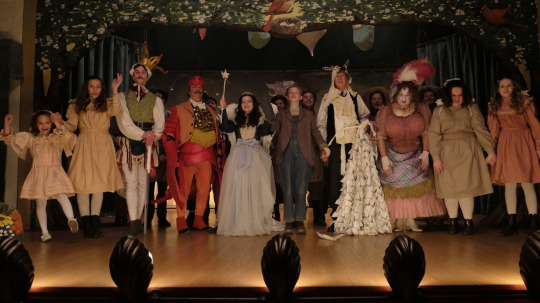
In the the sixth episode of Season 2 of Anne with an E entitled "I Protest Against Any Absolute Conclusion," the community of Avonlea comes together to put on the annual Christmas Pantomime. In this meta, I offer my analysis of this story within a story.
Not only does the plot of the panto draw heavily upon the story of Adam and Eve, but in my interpretation, it also allegorically serves as a way for Avonlea to use the medium of the theatre to process and come to grips with the threat that the grifters posed to their "magical island" community.
First, a brief synopsis of the play:
The opening number introduces the audience to an agrarian community residing on a "Magic Fantastical Island." Our hero, a farm boy, encounters a Fairy Princess who, seeing The Boy's hard work and goodness, bestows upon him a Golden Apple Tree which he vows to faithfully protect. A Dame happens upon the Golden Apple Tree and asks The Boy to hand her one of its fruits, but he refuses. When the Dame steals an apple, the Devil Lobster appears accompanied by a catchy tune. Things seem bleak when the Devil Lobster gets ahold of one of the apples, but a Prince on a noble steed arrives to vanquish the evil foe. However, the Devil Lobster thwarts the Prince by crushing his sword in his claws. As stormy skies swirl overhead, The Boy digs a large Black Hole with his trusty shovel and tricks the Devil Lobster into falling in. The hole swallows up the Devil Lobster, the day is saved, and they all lived happily ever after!
The Panto as Allegory for the Grifter Arc:
Ultimately, this play tells a simple story in which good triumphs over evil with a moral about resisting temptation and the perils of greed.
I would like to call attention to the fact that the apples are painted gold. Like their edenic counterpart, they symbolize sin and temptation, but in the context of this allegory, they also represent the enticing prospect of finding gold in Avonlea.
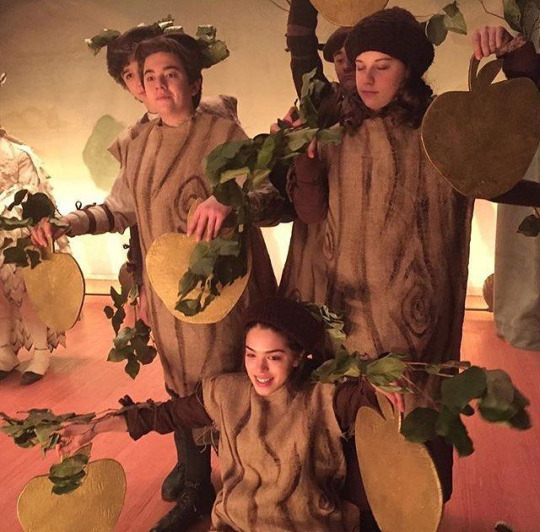
One of the Prince's lines suggests that if the Devil Lobster got his hands on the golden apples, it would bring spoil and rot upon the town's land ("You think you can turn our land into rot?/ I'm the unconquerable prince, lest you forgot!"). This parallels the threat that the mining operation posed to Avonlea—digging up the earth in the hopes of finding gold would have defiled the land and brought environmental destruction to the small farming town.
The Devil Lobster is defeated by falling into the Black Hole—this bears a striking resemblance to how Mr. Dunlop was ultimately caught by the townsfolk in S2E3 after he fell down the mining shaft at Nate's dig site.
It's significant that The Boy is the one who digs the hole to stop the Devil Lobster. The Boy represents the every child, and more specifically, the youth of Avonlea. While the adults of the town were easily swindled by Nate and Mr. Dunlop's gold scheme, it was children, specifically Anne, Diana, and to some extent Jerry, who were able to see through the grifters' ruse, put all the pieces together, and try to stop them from getting away with their scheme.
The version of events rendered in the play puts a more heroic spin on the role The Boy plays in thwarting the evildoer. He actively sets a trap for the Devil Lobster using the pivotal prop—a shovel—to do so. Since a shovel is a tool of excavation, this reflects how the excavation site Nate initially used to stage his con became a trap and holding place for Dunlop when their ruse came crashing down.
In reality, our child heroes were not so active nor successful in thwarting Nate and Dunlop. Only Dunlop was captured whereas Nate got away with the money. After their sleuthing in Charlottetown, Anne and Diana tried to warn the Barrys about what they'd discovered, but Diana's mother wouldn't hear any of it. Anne told Marilla who thankfully believed her, but by then it was too late, and the two literally got tied up. Meanwhile, Jerry had his own moment of realization, finally recognizing the boarders as the thieves who mugged him and stole his money in the finale of season 1. He tried to throw a punch at Nate, but got beat up again and fell unconscious. Mr. Dunlop only fell into the hole, not by any of the children's doing, but because he and Nate turned against each other.
The play credits the children as the real heroes in the story and offers a happier ending than the real version of events in which the community is still reeling from the financial blow of the con, lingering distrust—especially of outsiders—and feelings of regret and shame. In particular, we see how Marilla blames herself for inviting the boarders into their community and how the fallout of the the con hits the Barrys especially hard, manifesting as marital conflict between Diana's parents. The play's happier version of events helps the town process the ordeal they've gone through and imparts a moral they learned from the experience.
Each Character's Role in the Panto:
Anne as The Boy: Like the show itself, Anne is the protagonist of the play, our plucky hero. Her stepping into the role of The Boy was foreshadowed with her trip to Carmody earlier in the episode during which she dressed up like a boy. It's also fitting that Anne plays this part since she was the one who put all the clues together about the boarders' true intentions. The fact that Anne replaces Josie in the lead role of the play, as well as Matthew's last-minute substitution for Billy as the Owl, signifies that Anne and the Cuthberts are forces of progressive change in Avonlea.
Diana as the Fairy Princess: Most characters, including Anne, see Diana as the angelic image of a proper lady. She's generous, sweet, beautiful, and comes from a wealthy family. Like her Fairy Princess counterpart who awards The Boy for his hard work, Diana sees Anne's virtues even when others don't, and overall is a supportive and generous friend.
Matthew as the Owl: Matthew stepping into this role is foreshadowed in his flashback with his brother Michael in which a young Matthew can be seen whittling an owl figurine. Owls are associated with wisdom and true sight. This is a fitting choice for a narrator character in a play and also suits Matthew who demonstrates real wisdom.
Mr. Lynde as the Devil Lobster: In S2E2, a townsperson remarks that Mr. Lynde shows no moderation whatsoever as he piles his plate full of sweets. The Devil Lobster is the embodiment of greed and avarice and proclaims that he is "simply shimmering with sin." Tamatoa who? I only know the Devil Lobster! Also, it's clear that Rachel is super into seeing her husband acting a bit naughty and decided to have some fun with this casting choice.
The minister as the Fair Dame: Seeing the minister in drag is played for comedic effect. The Dame plays the part of Eve taking the apple from the Garden of Eden. While the minister was skeptical about the gold testing business, he did not dissuade the town's eagerness for material riches and therefore also shares responsibility for inviting avarice into Avonlea.
Mr. Phillips as the "Unconquerable" Prince: This is also played for laughs as it demonstrates Mr. Phillip's inflated sense of ego. He envisions himself as a gallant hero when in reality, he is anything but. The Prince is ineffectual at fighting off the Devil Lobster and runs away like a coward, much like how the adults and authority figures of Avonlea were completely bamboozled by the grifters.
Rachel Lynde as Queen Victoria: Perhaps a narcissistic casting choice on the part of Rachel, but let's be real, she was the artistic director behind this whole production and knocked it out of the park. Pop off, queen!
I hope you enjoyed this discussion of the "play within a play" in S2E6 of Anne with and E. This is probably my favorite episode in the whole series due to its many wholesome moments, especially Jerry giving Anne his Christmas card, Gilbert and Bash coming over to the Cuthbert's for Christmas dinner, and Matthew overcoming his stage fright. 10/10 would recommend. Of course the Christmas episode absolutely slaps!
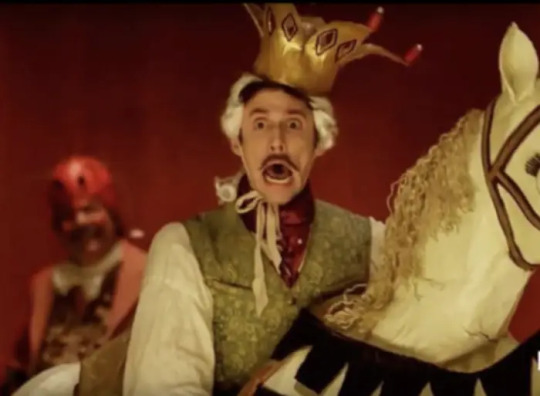
#anne with an e#awae#awae s2e6#anne with an e s2e6#Christmas pantomime#meta#story within a story#i protest against any absolute conclusion#christmas panto#anne shirly cuthbert#matthew cuthbert#diana barry#mr. phillips#thomas lynde#rachel lynde#awae meta#anne with an e meta#i love media analysis#episode of all time#my favorite episode#i love this show#the devil lobster song slaps way harder than it has any right to#lowkey appreciation for the grifter arc#i know it's unpopular#but it serves a purpose#and presents a conflict that affects the whole community#and the natural word itself#extractivism is presented as an existential threat#ecofeminist slay for awae wbk#it makes up for the liberalism of “a gender balance” in S3
18 notes
·
View notes
Text
HOT AMERICANO ft. sylus
content: alternate universe, implied f!reader, fluff, sylus is a bit of a bully n overbearing, reader works at a coffeeshop, sylus can't flirt for the life of him, so he just uses intimidation and hopes for the best kinda xx
a/n: so, i just kinda wrote this at 3am and idk it made sense when i was typing it, idk if it makes sense now, so uh just leave it or take it *cries*. wc. 974 . rbs are very appreciated <3
m.list

your days have been monotonous for a while. wake up, get ready, off to your job, then get back home.
it really put you in a bad mood for some reason.
at 8:30 you'd reach the coffee shop, spend six hours there dealing with grumpy costumers and a low paycheck, then you'd come back home, exhausted, only to repeat the same thing the next day.
you thought you'd never get a break from the stillness, stuck in a never-ending loop, waiting to break the curse.
“hi, what can i get you?” you politely ask the umpteenth costumer, your gaze not even raising from your feet as you wait for them to answer.
“an americano. hot.” a magnetic voice reaches your ears, so captivating you feel compelled to raise your eyes and meet its owner.
the man doesn't look over thirty. his slender finger tap on the table, while his eyes are locked on you. ruby eyes.
you feel so small under his gaze, feeling piecered by thousands of daggers.
the fascinating stranger wears a leather jacket, black, that compliments his fair complexion and silver hair.
“cat got your tongue?” you're suddenly pulled out of your in depth analysis.
your face flushes, as you stagger, muttering a “oh yes. it'll be ready in a bit?”. it sounds like a question, even though it is not supposed to. you want to smack yourself. what a good way to ruin your reputation, caught red handed as you're gawking at a random stranger.
except he's a fine looking stranger. extremely fine.
he hums in response and you excuse yourself, almost sprinting as you quickly shift behind the counter.
you finally put yourself to work, except you now feel a pair of eyes studying you, watching your every move. you think you're just imagining things. except, when the coffee is ready, as you place the cup in front of him, you meet his indecifrable gaze.
“here,” you mutter and almost shove it against him. his eyes hide a hint of amusement, although you can't tell much by his illegible countenance.
you turn around, ready to leave, when he calls out to you, “you got me the wrong order, sweetie.”
you don't like how the pet name makes you feel, at all. you inhale, exhale, then plaster a smile on your face, “let me see, you asked for a hot americano?”
“yes i did. i don't think an americano has any milk, does it?”
you freeze. your eyes meet his, then slowly glide down at the cup. latte art is the first thing you notice. oh no.
with a mortified expression, a chain of apologies leaves your mouth, as you try to take the cup awa from the table. what a day.
“leave it as is. when do you finish work?”
“in thirty minutes,” your answer is involuntarily instant.
“i'll drink this,” he points at the cup, his hard features now molded into an entertained expression. you notice the corner of his mouth is slightly raised upwards.
“but in exchange, you have to meet me as soon as your shift ends,” his tone is beguiling, is invitation even more. but you don't understand the reason for it.
“it's not a problem for me to remake your drink, sir. it'll be on the house,” you try to wiggle your way out.
but the bemused look doesn't leave his face, as he pushes his upper body forward, reading your name tag.
“miss [last name], looked inappropriately at a customer, mixing up his order and wasting his time,” he says, his tone stern, not loud nor quiet.
heat spreads out on your cheeks, as you bite your lip nervously, doing your best to avoid his eyes.
“alright,” you say. you're too tired to even ask for the reason why he wants to meet you. maybe he wants to beat you up, then quietly dispose of your body. he does have the look of a gangster.
probably, he'll even call his sidekicks to do the job. you chase that though away, biting your inner cheek.
either way, you're not too upset about your supposed approaching death.
“good girl,” your heart makes a leap. you nod and run off, hoping and praying he hasn't noticed your reaction.
you hope time freezes.
except what feels like an eternity finally comes to an end, and you find yourself out of the coffeeshop door.
he's leaning against a car, one that you couldn't buy even if you saved up all your paychecks for ten years.
you nervously approach him, feeling out of place.
“you’re here,” he walks towards you, until only a few inches separate you two.
you look up to meet his eyes, before involuntarily stepping backwards.
“i don’t bite, kitten,” he says, lowering his head to meet your height.
“so,” you clear your voice, “may i know what you need me for?” you ask him, averting your gaze. you don’t care if you sound too brusque, you can’t wait for things to get done quickly.
a chuckle leaves his lips. “oh, you’re decisive. i like it,” he says, the last words almost whispered to the wind, as he takes a small paper from his pocket and scribbles something on top of it with a pen.
“here, take it,” and you grab it right away, almost enchanted.
“i don’t think we can do anything today, i hope next time you won’t be trembling as much as today, i prefer it when you’re fierce, kitten.” he turns around, “oh, and i’ll be waiting for a message,” he finishes.
time doesn’t allow you to find words of rebuttal.
he turns around before you can formulate an answer and drives away, leaving you and your piece of paper.
your eyes slowly look at it, heart thumping fast, and still refusing to believe the last interaction was real.
04 xxxx xxxx
— sylus qin
he left you his number.
© sylusgworl - 2025, all rights reserved / i don't allow anyone to copy, repost on other platforms or sell my works.
#★.kay writes#love and deepspace#lads#lnds#l&ds#sylus#lads x reader#lnds x you#lnds x reader#lnds sylus#lnds fluff#lads x you#lads fluff#love and deepspace fic#love and deepspace x reader#love and deepspace fluff#sylus x reader#sylus x reader fluff#sylus x y/n#sylus x you#sylus x mc#sylus fluff#qin che#sylus qin
194 notes
·
View notes
Text
tomorrow won't come for those without, or exploring disconnection in the procession of mental illness and trauma
SPOILER? WARNING: This analysis assumes you have played the game's noise ending at least once. I'll provide screengrabs of things where I can. I do believe it's a masterpiece of a game, and would highly recommend it.
CONTENT WARNING: Discussions and allusions to suicide, severe mental illness, grief and religious trauma/criticisms of religion.
Tomorrow won't come for those without (TWC for short) is really... confusing. To the extent where I've got a notebook with pasted cut-outs of dialogue and imagery simply to try and... understand it.
As with much of the things I write about, I don't think it's designed to be understood - etherane's work often revolves around very personal and complex depictions of mental illness, as is evident from the hello charlotte series, so this is to be expected.
I want to discuss Rem, celestials and the Dithyrambs in this, saving conversations of Mari and the Choir for when I better understand it.
Rem is not human, he's a celestial - this is revealed in the noise ending, where he melts into his true form. We can also determine what type of celestial Rem is, from the way his form manifests.
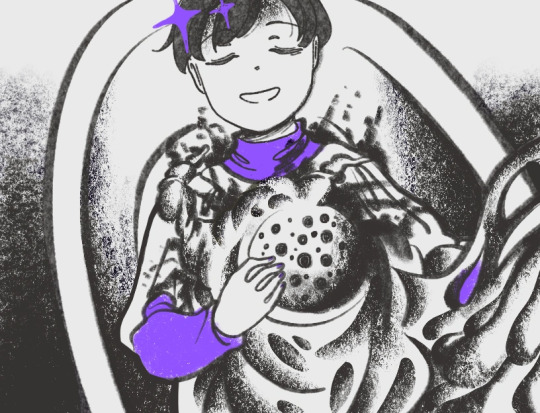
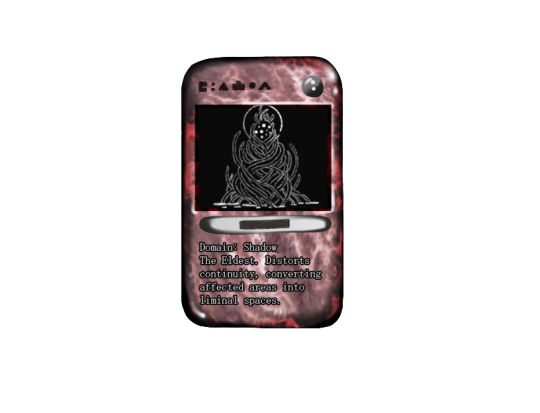
Domain: Shadow; The Eldest. Distorts continuity, converting affected areas into liminal spaces.
Now, at first, I spent much of my time trying to associate these cards (and as such, the Celestials) to specific mental illnesses, but I realised it didn't work. While 'Domain: Post-Truth' (Card Type 3) could be associated with PTSD and 'Domain: Thighs' (Card Type 12) could be associated with body dysmorphia, many cards do not fit a specific mental illness, and much of them instead reference dissociation or other specific symptoms. It's somewhat implied Mari had the celestial present in Card Type 12.
It makes sense for a different universe to identify mental illness in a different way, considering there's little evidence that the characters have information on "pre-humanity". Instead of our current system surrounding mental health, the Choir demonises Celestials, and attempts to 'purify' them.
One particular line during the noise ending stands out to me.
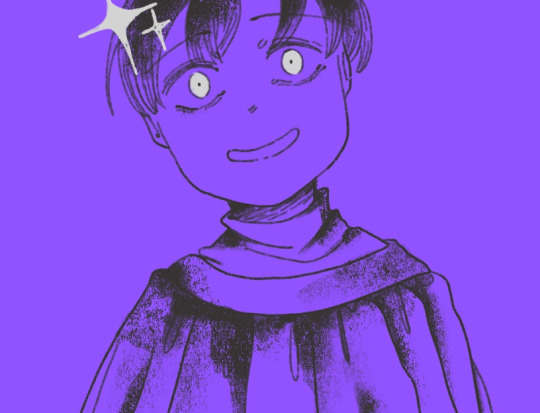
"Tell me, how do I stop the noise in my head?"
Ori is not, by any means, a stable character. That's not to say Rem is stable, but Ori is somewhat less rational, losing his mind over the Choir and his Rosary. He devotedly follows the Conductor up until the noise ending, where he loses his grip on purity and reality, wanting to stay in the 'Dark' and '...play in the forest', rejecting the suppression of creativity by the Conductor.
The Dithyrambs is the noise in Ori's head - somewhat implied to be caused by the celestial. When Ori first wakes up, the Rosary insists that he must "...find the source of the Dithyrambs," perhaps implying that the Rosary is corrupt in the same way Ori and the Choir are, although it does not state to destroy the source. This noise causes Ori a lot of pain.
Alright. That is my discussion of the actual evidence present in the game. The next section is going to be a lot of personal speculation, on what I feel the game is representing.
I compare the relationship between Ori and Rem to that of Charles and Scarlett in Hello Charlotte 3, although it is framed differently. Instead of Rem being portrayed as horrific and irrational, Rem is scared, small; humanised, distrustful.
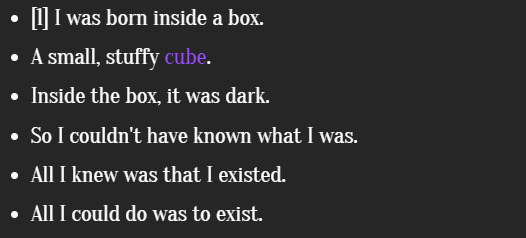

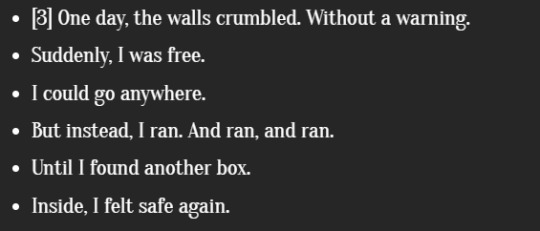
I believe that Scarlett Eyler and Rem represent fundamentally the same thing - intrusive thoughts, anxiety and OCD. Unlike Scarlett, who is fixated on tormenting Charles, Rem's representation of this manifests toward himself, and his desire to be caged for safety.
Fundamentally, OCD is a disorder surrounding fear. As much as it feels like your brain just, absolutely fucking hates you, it's as scared as you are. In a similar way, Rem is terrified of the liminal hotel that he and Ori reside in, and he's terrified of the outside world. He responds by shutting himself away - rather than Ori's desire to reach the end of the veils, Rem begins the game locked in a bathroom, and must be coaxed out.
Rem is incredibly "human" for a nonhuman being. Humanisation of intrusive thoughts is an interesting concept, especially considering the demon Scarlett Eyler was in HC3. Rem is far more disconnected from Ori, far more skeptical of the world around them. Rem isn't there to punish, but more to question and doubt, contrasting with Ori's inherently trusting nature.
Hmm. I feel like I haven't properly explained it, but I hope it somewhat makes sense.
Despite that, this is just my own interpretation of it, and I don't feel it really aligns with the game, necessarily. It's just me. lol.
song i listened to while writing:
I enjoy playing TWC with the BGM turned down and this song playing. It makes me feel pure, like my regrets can be washed off. I suppose that's not the point of TWC LMAOO.
#tomorrow won't come for those without#twc game#etherane#hello charlotte#game analysis#sentience's stuff#Spotify
54 notes
·
View notes
Text
So I happen to chance upon this blog which talks about the little cold war between Hange and Levi after he revived Armin instead of Erwin in the RtS arc.
Honestly, this is something which I did not delve deeper because it was just too much things happening for that whole sequence when I first watched it. After reading that analysis, and also chancing another post allegedly claiming that Hange's character is too shallow because she didnt show much emotion here when Erwin died, I just had to do something.
So, I just had to dig deeper into the manga and anime again, with the little analysis out there that highlighted Hange's character especially during that scene and decided to split this post into 3 parts, focusinf on Hange's cold war, or how she responded to Levi's decision.
Caution: Certain degree of Levihan lens is on.
--------------
Part 1: Rooftop
Part 2: Walltop
Part 3.1: Double date
Part 3.2: Double date/ Basement
---------------
Part 1: Rooftop
So, that blog talked about the difference betwen how Hange is drawn in the anime vs the manga, and I can agree that the drawing in the manga does indicate a little bit more about Hange's displeasure towards Levi for choosing Armin. I mean, she must have felt so disappointed and betrayed at the same time, after all her therapeutic talk to Mikasa to calm her down, only to lose her squad, Moblit, her commander and her eye. She lost a lot more than Levi in this battle, so of course she will be angry with Levi.
So, here are the panels in the manga which see her looking away from Levi
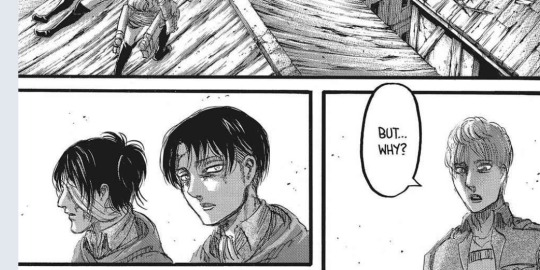
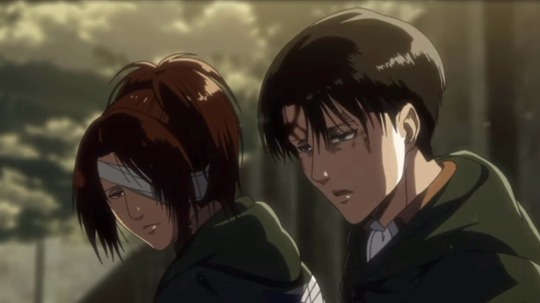
I also looked into Levi's dialogue at the start, when Floch questioned his decision. Here, Hange looked away while Levi looked towards Floch before talking but in the anime, both of them are looking at Erwin.
So I am guessing that in the manga, there is basically little or no interaction at all between Hange and Levi and Hange made it clear to Levi with her non-verbals. Also, I find it strange that Levi talked about forgiveness. Now, he may mean 2 things in the context of Floch questioning him:-
1) Will you forgive this guy (Levi) (direct reply to Floch but indirect expression to Hange)
Now, I know that the sub translated it as forgive him (Erwin). So I did a Google translation using speaker and microphone. And double checked that the pronounciation Google got and the one Levi said is the same. This is what I got for that paragraph.
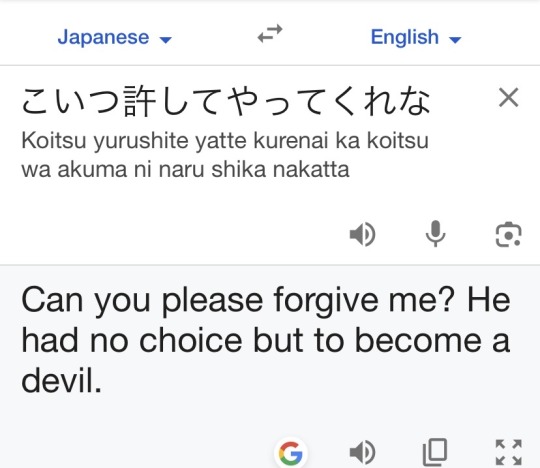
Now, I know I am just taking the translation literally by Google and it may be way way off because of how the language is used. So please forgive me if this is totally wrong 🙏
So, Floch was questioning Levi, Hange is avoiding Levi and Levi started his speech, explaining the reason for his choice.
If he had intended to ask Floch and Hange to forgive him, this gives an early indication that he can sense the emotional impact his decision has on Floch and Hange. Indeed, Floch didnt even join in the family discussion when the Armin woke up.
2) Will you forgive this guy (Erwin)?
If he had intended to ask them to forgive Erwin for his conflicting dreams, then I find it quite weird because that would mean that he had to tell them the real motivation of Erwin's drive to led Humanity against the Titans. Would he do that to Floch who is a subordinate? He might have told Hange everything and therefore asking her to forgive Erwin (and thereby understanding his decision). Then that would mean that Levi is basically ignoring Floch as he and Hange watched Erwin take his last breathes. So Floch's "Captain why?" Is sort of a cue for Levi to start talking to break the ice between him and Hange.
Also, isnt Erwin's devil characteristics (ruthlessness, determination, etc etc) the things the Floch and Hange needed for Erwin to be revived and led the Survey Corps after the huge losses? So, why would Levi ask them to forgive Erwin?
I am confused with the language here but these are just some of my observations and curiosities.
So anyway, whether it is the manga drawing of Hange looking away from Levi, or his dialouge, it does make sense to me that there are some tension between her and Levi.
--------------
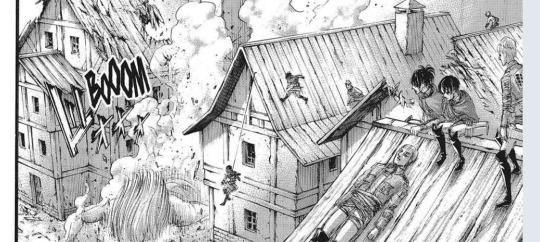
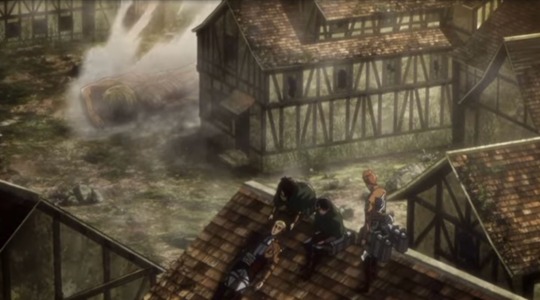
Now the other panel where the anime draw her looking at Erwin while the manga draw otherwise is when Armin come out of his titan body.
Ok, this scene should be familiar to all Levihan because remember how Levi will always stare death in the eyes when his comrades die but not at Hange in 132? This scene has been mentioned because he looked at Erwin as he die while Hange looked away, in the manga at least.
Similarly, there can be 2 reasons why:-
1) there is still tension between her and Levi and she does not want to have any interaction with him
2) or, she wanted to check that Armin's transformation is ok. Afterall, this is also the first time the Survey Corp stole the power of a titan and they may not know how the whole thing works still. But do note, that she is totally not her "Eren I want to touch that hand!" self.
Imagine Hange, having no reaction to the first time she sees a titan shifter gaining power. I think only Reiss family and the Marleyan warriors got to see that scene but Hange showed no reaction or excitement at all. So, please convince me that she is not sad at Erwin's death. She is obviously very very affected by Erwin's death. Probably she might also be thinking that Erwin could have been the one emerging out of that titan body.
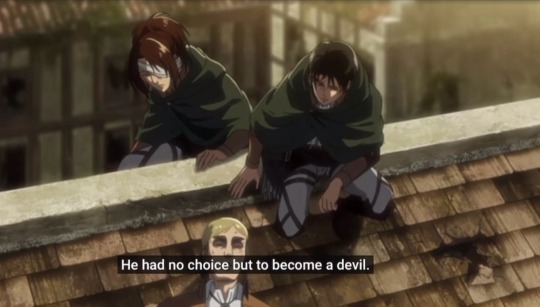
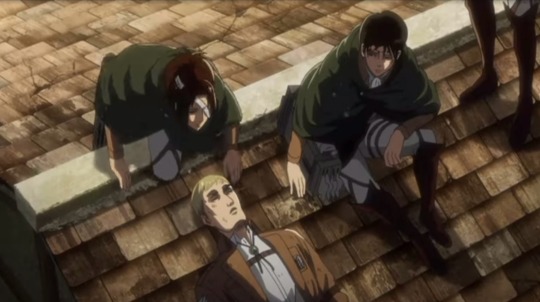
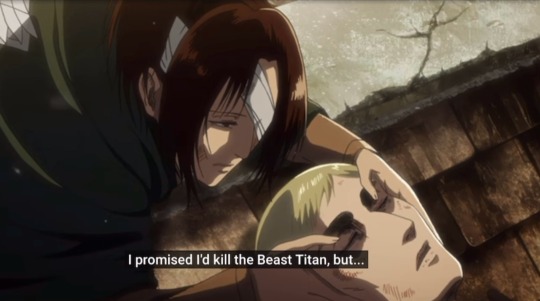
And in all these scenes, when Levi is talking, Hange did not respond, verbally or non-verbally.
The only respond she gave was after Levi gave his comforting speech to Erwin, that she said "he's dead". It is as if Hange is saying, there is no point in comforting him cos he is dead. But does Hange felt comforted by Levi's words? I dont think so.
So I do think that Hange is definitely angry at Levi and this little cold war between the 2 of them are starting to brew at the roof top here.
Plus, I also just want to mention how in-character Isyama has written both Hange and Levi. Remember how Hange used a cockroach to cover up her frustration after talking to Sannes? How she quietly sit down at the wall while thinking about her fears after taking her anger out at Nick? She hides her emotions and it is also clear that she is doing that here as she is processing her grief.
Levi, on the other hand, is so in-character with how he comforting a dying soldier: Complimenting them, affirming them and carrying on their strength and resolute on his shoulder. (I always find it weird that he complimented Erwin but now I get it. It is his way to encourage or send off the dying)
A short clip on the rooftop scene and Levi sending off his soldier in episode 9.
Levihan's Cold War [Part 1] [Part 2] [Part 3.1] [Part 3.2]
#aot#attack on titan#hange zoe#shingeki no kyojin#snk#levi ackerman#levihan#manga analysis#levihan analysis#hange analysis
26 notes
·
View notes
Text
Asexual Awareness Week and BG3
Below the cut is 1,100+ words of interpreting Wyll Ravengard as demisexual. As an asexual person, I relate to many of Wyll's desires and experiences. That relation has lead me to this interpretation of him as a character. Interpretation is the key word here. This is simply another way view this character and gain insight. It's obviously extremely biased, which is why I put the word count first. So if your interested in analysis that is probably more projection than interpretation, I bring you this.
Wyll is portrayed as an almost incurable romantic. He constantly references stories, tales, fables, and myths when discussing his romantic desires. Romance heavily influences his sexual desires as well. It is practically inherent to his sexual attraction. While this can be viewed as idealism, I want to propose an alternative outlook. One where he hasn’t conflated romance and sexuality, but rather one where romance is vital to his sexuality.
Wyll talks little of his sexual habits outside of when romance is being discussed. These quotes are about dancing, but they happen while you’re romancing him.
“Don't worry! It's not really about the dance, it's about who's we're dancing with.”
“I had years of lessons but in truth it's all about your partner.”
Like when you’re romancing most companions, many things said have multiple meanings or implications. He’s telling you that while he does enjoy sex, it’s who you’re doing it with that makes it truly pleasurable. I think Wyll desires the intimacy that comes from sex more than the act itself. He’s drawn to the connection it brings rather than the pleasure.
At one point he describes his sexual history as “tight-laced” when he’s talking with Shadowheart. He says, “I was never one to sew my wild oats.” Apparently Wyll hasn’t had to practice and exercise much sexual restraint in his life. It’s easy to control one’s sexual desires when you don’t really feel them to begin with.
While he can understand people’s various sexual habits, I don’t think he can relate. He doesn’t see the appeal to casual sex. Sex doesn’t feel satisfying to him without connection. He has impulses, and sometimes he wants to act on them, but they don’t seem worth it. He doesn’t derive enough pleasure from the act alone to pursue it. Romantic relationships already provide sex, and he values love above all else. Why would he want anything else?
“Eh-heh, well, give it some time! Develop a bond, and…maybe I'll show you a move or two.”
“Hm, think of love as a strong ale, or a warm fire. Is the clang of steel on steel not made more satisfying by the pleasures that come after?”
Doesn’t sex feel decidedly better when you’re having it with someone you care for? How satisfactory can it be without attachment? How truly enjoyable is it without a bond?
“I value affection, over fun. A lasting memory over a passing fancy.”
“But I’ve always been a bit old-fashioned on these matters. I find more pleasure in a courtly dance, than a loveless fling.”
Isn’t it more fulfilling to love someone than lust for them? Do you not feel more fulfilled from loving someone than sleeping with them? Is sex even worth having without love?
“Gods I want you, but I can't take your body without taking your heart.”
Can Wyll even give you his body without giving you his heart? They seem to go hand in hand for him. Love is essential to his sexual enjoyment, he doesn’t seem to experience sexual desire without it. Love might be the only way he can desire it. Here is an interaction between him and Astarion.
Astarion: "You didn’t kiss anyone until you were fifteen?! Gods. What a tragic, sheltered life."
Wyll: "Sheltered? Not at all! I was exposed to all manner of riot and revelry. Hells, my father even urged me on once or twice."
His romantic tendencies don’t come from inexperience or prudishness. Wyll isn’t oblivious or naive when it comes to sex. He’s been exposed and even encouraged to have it. While he might call it “proper”, Wyll is aware his way of courting isn’t for everyone. Your sexual habits might not align with his personal wants, but he won’t respect you any less for yours. Wyll does not believe your sex life effects your worth. If anything, he feels his wants are regressive.
“But I still keep faith in the old tales of love. The ‘once upon a times’ and the ‘happily ever-afters’.”
“I'd, like to do this the proper way. The way of the old romances sung by the bards.”
“But I’ve always been a bit old-fashioned on these matters.”
He constantly uses the word “old” to describe his courting methods. He’s acknowledges these desires aren’t modern, and by referencing fairytales he’s aware they might even be fictious. He calls his sexual habits “tight-laced”, his romantic intentions as “old-fashioned”. They’re not exactly said negatively, but more with the acknowledgment that his wants come across as restrictive. When the habits of today hold no appeal to you, you feel stuck in the past. What are you supposed to do when fiction seems to be the only place where romance is done how you’d like?
If you have sex with Mizora, these are some of his responses.
“You shared your body with the fiend who holds my soul.”
“We danced! We made a connection…and you severed it for a single bite of the Hells?”
This next quote is how he responds if you say, ‘Can you blame me? It’s not like you’ve been putting out.’
“Is that what matters to you? Sex without union? Heat without heart? Did you not take joy in the dance?”
Now obviously the biggest issue is you slept with the being that holds his soul. However, he says these things because he thought you felt the same way about sex as he does. He thought sex was an act as precious to you as it was to him. He thought you also prioritized love over physicality. He thought you enjoyed the way things were going, clearly he was. Had he known you didn’t feel the same, he probably never would’ve pursued you.
Wyll doesn’t do casual, he doesn’t do “let’s see where this goes”. He seems like the type to pursue every romance with the intention of marriage. No, he won’t propose on the first date. He won’t even necessarily think either of you are compatible. However, that’s the whole point of courting! It’s to test the potential of forever. He likes agreements, he likes pacts. He wants certainty, reliability.
Yes, he probably hasn't had much firsthand experience with relationships. Yes, all these things can be seen as restraint. Yes, they can be seen as repression. They can also be seen as someone who knows himself and genuinely wants “happily ever after”. Someone who’s aware of what he’s asking and wants you to desire it as well. Maybe love is the only way he can connect to his sexual desires. Maybe love is important to him because it’s the only way he can truly enjoy sex. Love might be the only thing that lets him experience sex like everyone else. Maybe love is the only thing that let's him feel sex like it’s described in fantasy. Maybe he’s lost in that fantasy, or maybe he’s just demisexual.
#baldur's gate 3#bg3#wyll ravengard#bg3 wyll#asexual awareness week#asexual#demisexual#astarion#I have another one I'm working on for Astarion#It's about sex repulsion and amanormativity#🎮 bg3#🎮 mine
131 notes
·
View notes
Text
soo if it wazn't obviouz . ive been sorta crazy about thiz song for a hot minute [itz my blog aesthetic atm like c'mon] and i feel like itz about time i give it a proper analysis
"I Should Be Unfinished" – Dobu no Awa with the boy . HV! Tony
"From right to left over and over and over and over again" – thiz could reprezent the fact Tony feelz stuck in that neverending loop of suffering . and how he seez no point in trying to live anymore
"I feel my ears overflowing with blood" – not only iz thiz a parallel to DHMIS 2 . but i also think it fitz in with HV! Tonyz lore phenomenally ; the "blood" can reprezent "life" in thiz scenario and . given who he iz after all . thiz "blood" iz no longer a part of him – figuratively and literally
"I'm tired of hearing it // I've had enough of this // I've memorized it // And yet I've fallen into the habit of pretending that I had forgotten" – once again . representative of the neverending cycle he feelz trapped in ; could also symbolize the fact people around him are alwayz of the mentality of "it getz better !! don't give up !!" and that he feelz sick of hearing thiz . since hez been around for so long and "nothing haz gotten better" – still . he haz thiz facade of arrogance that he uzez to brush off said commentz and "forget" about them . and the constant reminderz that they bring
"It's futile, no matter how much time I wasted // I'm still unfinished" – Tony seez himself az a very one dimensional person – he feelz like . even with all the time hez spent in the world . he hazn't been able to recover from The Event ; he still feelz incomplete becauze of the fact he can't let go . hence him being "Unfinished"
"'Like that–' // 'Such a thing–' // 'What's happened?' // 'Was that not it?'" – i feel like thiz part iz actually in relation to the fact hez been through so much and . in each era of hiz life . he hazn't been able to find something – someone – that would help him feel alive and / or hazn't ended horribly
"Even if I cried out // Even if I tore my hair // You should have a look, // It's not like I can disappear" – still . deep down . he cravez connection and having a sense of safety and belonging – he wantz someone to look at him with compassion . even if he'z so broken and bruized ; he cannot disappear completely . he'z already dead . so might az well forget looking forward to a peaceful . everlasting slumber
"Why don't we end that escape drama? // are you worn out? Let's take a break..." – personally . i see thiz az the shift in HV! Tonyz life – it goez from the bleak . isolated everyday to a slightly more tolerable and exciting experience after meeting Sketch ; stop running . even for just a moment . and letz sit down together . breathe and take a break – you must be terribly tired ...
"Suppose you've wasted that much to complete it? // Can you really say that it's right, in all sincerity, // Without averting your eyes?" – now met with care and love from people around him . he can't accept it – he must prove to people that someone az wretched az him should be left to rot . not be cared for . az hez just dead weight ; i also think that thiz iz a genuine question that he pozez to otherz . az he cannot understand completely why or how hiz loved onez can find themselves to put up with him – maybe by finding an answer . he can finally start learning to value himself properly az well
"Even if I grieved // Even if I made a fuss // You should have a look at what remains of me" – even with all hiz flawz . maybe Tony can at least accept that he still cravez to form a bond with otherz – to have something he once had again . even if he'z now "wrong" . "broken" . "Unfinished"
"I don't want to deceive myself anymore. // Are you worn out? Then let's take a break." – you're with people who love you and who you love – stop running from the truth . sit down . take a break.
"Even if I cried // Even if I was sorry // You should have a look // Give it back to them!" – i have shown you all there iz to show – all the remorse and how much i lament thiz event – give thiz happiness back to him . to her . to everyone else ; give it back. to them.
"This is how it should be, I'm alright..." – "Unfinished" . "broken" and "wrong" – thatz all i'll ever be . and thatz fine by me ; nothing can be done to alter who i am . and thatz just how thingz are going to be
"This is how it should be. I'm alright. // Hey, I'm worn out already // Goodnight..." – "Unfinished" . "broken" and "wrong" . thatz it.
#not to mention the songz mv also – that and the lyricz combined together really make it fantastic#i wish it waz on Spotify too . cuz it would probably be my top song of 2025#like . itz very relatable#unfortunately#://#spooky's soliloquies#dhmis#dhmis au#high voltage au#dhmis tony#dhmis hv tony#im sorry for thiz – cringe and dumb and stupid yadda yadda#i just feel sorta dull . but these analyses do make me feel a tiny bit better#like . i feel like i can write mini essayz and express my point of view sorta okay-ish#never am i ever gonna stop projecting onto that clock vampyre thing#kissing him
5 notes
·
View notes
Text
Analysing lines from the Deltarune: Chapter 1 en lang file every two days until the next chapters: #41 (lines 169-172)
* KRISP!! * awa... ver sorz... * tem already have partner… * tem partner with... * EG!!! * (It's a black-and-white hardboiled egg.) * (Sadly, seems like it already has a partner.)
<! --
"obj_tem_school_slash_Other_10_gml_8_0": "* KRISP!^1!&* awa..^1. ver sorz..^1.&* tem already have partner…/%", "obj_tem_school_slash_Other_10_gml_13_0": "* tem partner with..^1.&* EG!!!/%", "obj_tem_school_slash_Other_10_gml_20_0": "* (It's a black-and-white hardboiled egg.)/", "obj_tem_school_slash_Other_10_gml_21_0": "* (Sadly, seems like it already has a partner.)/%",
-- >
tem… WATCH EGG!!! eg… wil HATCH!!! tem… PROUD PARENT!!
Lines from one of the Temmies in UNDERTALE; it seems she likes eggs.
As much as we would want to mention Susie, it may be more fitting in nearly a hundred more lines.
Do know that those lines will be referenced again later.
Either way, very heavy analysis and hours of thinking about those lines and the story of DELTARUNE lead us to believe that this is a joke which slightly helps the plot by making it so that everyone has a partner before Susie arrives aside from Kris, leading to them getting grouped together. (slight scarasm (understatement of the century (hyperbole)))
3 notes
·
View notes
Text
Construction Cement and Aggregate Market Growth Analysis, Market Dynamics, Key Players and Innovations, Outlook and Forecast 2025-2032
According to industry analysis, the global construction cement and aggregate market was valued at USD 198.22 billion in 2024 and is projected to reach USD 255.02 billion by 2032, growing at a Compound Annual Growth Rate (CAGR) of 3.9% during the forecast period (2025-2032). This growth is primarily driven by rapid urbanization, infrastructure development, and increasing construction activities across both emerging and developed economies.
Download FREE Sample Report: Get Sample Insights
What are Construction Cement and Aggregates?
Construction cement acts as the binding agent in concrete production, while aggregates - including sand, gravel, and crushed stone - provide foundational structure and volume. These materials form the backbone of modern construction, essential for everything from residential buildings to massive infrastructure projects. Cement's unique hydraulic properties allow it to set and harden underwater, making it indispensable for dams, bridges, and marine structures, while aggregates account for 60-75% of concrete's total volume, providing crucial compressive strength.
Key Market Drivers
1. Global Infrastructure Boom Accelerates Demand
The surge in infrastructure development is significantly boosting cement and aggregate consumption worldwide. Major initiatives like India's National Infrastructure Pipeline (NIP), China's Belt and Road Initiative, and the U.S. Infrastructure Investment and Jobs Act are driving unprecedented demand. In India alone, cement production grew by 9.2% year-on-year in May 2025, reflecting the material's critical role in national development strategies.
2. Urbanization Creates Construction Material Needs
Rapid urban migration is generating massive demand for housing and city infrastructure. Indonesia's plan to build 3 million homes annually and Africa's projects like Tatu City near Nairobi demonstrate how urbanization drives material consumption. As populations concentrate in urban centers, the need for cement and aggregates grows exponentially for housing, roads, and utilities.
3. Government-Led Housing Initiatives
Public housing programs worldwide are stimulating market growth. India's Pradhan Mantri Awas Yojana (PMAY) with ₹11 lakh crore allocation and Indonesia's mass housing plans supported by Qatari and Emirati financing are creating sustained demand. These programs not only address social needs but create reliable, long-term markets for construction materials.
Market Challenges
1. Environmental Regulations Present Compliance Challenges
Cement production accounts for 7-8% of global CO₂ emissions, facing increasing regulatory scrutiny. The EU's Carbon Border Adjustment Mechanism (CBAM), India's CPCB emission standards, and U.S. EPA regulations are reshaping production methods and increasing costs. Manufacturers must invest heavily in cleaner technologies to remain compliant while maintaining profitability.
2. Energy Price Volatility Squeezes Margins
With energy costs representing 35-40% of cement production expenses, recent fluctuations in coal and natural gas prices have created significant operational challenges. Some plants have temporarily suspended operations during price spikes, disrupting supply chains and project timelines across the construction sector.
3. Logistics Bottlenecks Disrupt Distribution
Transportation networks strained by pandemic recovery struggle to move bulk materials efficiently. Freight costs have risen 20-30% over pre-pandemic levels due to driver shortages and rail capacity constraints. These logistical challenges compound material shortages and delay construction projects globally.
Market Opportunities
1. Green Cement Innovations Open New Segments
The development of low-carbon cement alternatives presents significant growth potential. Technologies like geopolymer binders and CO₂ mineralization are gaining traction, with the global green cement market projected to grow at 13% CAGR through 2030. UltraTech Cement plans to increase its green energy share to 85% by 2030, reflecting the industry's sustainability shift.
2. Digital Transformation Enhances Efficiency
Industry 4.0 technologies offer substantial improvements in production economics. Digital twin implementations demonstrate 8-12% productivity gains, AI-powered quality control reduces waste, and optimized routing cuts fuel costs by 15-20%. These digital solutions help manufacturers maintain output amid labor shortages while improving margins.
3. Emerging Markets Offer Untapped Potential
Africa and parts of Southeast Asia present significant growth opportunities, with cement consumption per capita at just one-tenth of global averages. As these regions develop infrastructure and urbanize, their construction material demand is expected to rise dramatically in coming years.
Competitive Landscape
The market features a semi-consolidated structure with global players and regional champions:
LafargeHolcim leads with approximately 7% global revenue share and its ECOPact green concrete range
CNBM and HeidelbergCement collectively hold over 12% share, with CNBM operating the world's largest cement plant
Regional players like UltraTech in India and Dangote Cement in Africa are expanding aggressively
Product innovation remains key, with Cemex and CRH leading in circular economy solutions
Recent developments include Dangote Cement's CNG infrastructure partnership and LafargeHolcim's CO₂-cured concrete collaboration, highlighting the industry's sustainability focus.
Market Segmentation
By Type:
Cement: OPC, PPC, sulfate-resistant, white cement
Aggregates: Sand, gravel, crushed stone, recycled aggregates
By Application:
Residential construction
Commercial buildings
Infrastructure (roads, bridges, dams)
Industrial facilities
By Region:
Asia-Pacific dominates with over 60% of global consumption
North America and Europe focus on value-added products
Middle East invests heavily in production capacity
Africa offers significant growth potential
Report Scope & Offerings
This comprehensive analysis provides:
Market size and forecasts through 2032
Competitive analysis of 20+ key players
Detailed segmentation insights
SWOT and value chain analysis
Emerging technology assessment
Regional market dynamics
Access Full Market Intelligence: Construction Cement and Aggregate Market Report 2025-2032
Download FREE Sample Report: Get Sample Insights
0 notes
Text
Tamil Nadu Outpaces Centre in Funding Key Central Welfare Schemes

In a significant revelation, Tamil Nadu Chief Minister M.K. Stalin recently highlighted that the State contributes more than the Union government to several major Central schemes. While these programmes are officially designed and partially funded by the Centre, the real financial weight behind their implementation in Tamil Nadu comes from the State government.
Tamil Nadu’s Bigger Role in Six Major Central Schemes
A detailed analysis of both Central and State records shows that Tamil Nadu’s financial contribution exceeds that of the Centre in at least six Central welfare and development schemes, including:
Indira Gandhi National Old Age Pension Scheme (IGNOAPS)
Indira Gandhi National Widow Pension Scheme (IGNWPS)
Indira Gandhi National Disability Pension Scheme (IGNDPS)
Pradhan Mantri Awas Yojana – Rural (PMAY-R)
Pradhan Mantri Matsya Sampada Yojana (PMMSY)
Jal Jeevan Mission (JJM)
These three pension schemes fall under the National Social Assistance Programme (NSAP) umbrella.
What CM Stalin Said
During an event in Salem, CM Stalin said, “Even for schemes named after the Prime Minister, the State government provides over 50% of the cost. Without this, implementation would not be possible.”
This statement has brought attention to the financial asymmetry in so-called Central schemes.
The Ground Reality Behind the NSAP
Although the NSAP is officially funded by the Union government, Tamil Nadu has long been ahead in supporting welfare pensions. As early as 1962, the State had launched its own old age pension scheme. Over the decades, it expanded to cover widows, persons with disabilities, agricultural labourers, and deserted women. These were eventually subsumed into NSAP in 2007.
Funding Breakdown: NSAP Schemes
Old Age & Widow Pensions
Centre: ₹200–₹500/month
Tamil Nadu: Adds ₹700–₹1,000 to ensure a total of ₹1,200/month
Disability Pensions
Centre: ₹300–₹500/month
Tamil Nadu: Contributes the remaining amount to make it ₹1,500/month
Additionally, Tamil Nadu runs its own scheme for persons with disabilities, fully funding ₹1,500/month without Central support.
PMAY-Rural: State Share Nearly Double
The Pradhan Mantri Awas Yojana – Rural (PMAY-R) aims to provide housing for the poor. Officially, the funding ratio is 60:40 (Centre:State) in plain areas. But in Tamil Nadu, the actual cost distribution tells a different story:
Total unit cost per house: ₹2,83,900
Centre: ₹1,11,100 (39%)
State: ₹1,72,800 (61%)
The additional State cost includes RCC roofing and funds integrated from NREGA and Swachh Bharat Mission for toilets.
PMMSY: State Bears the Major Share
Under the Pradhan Mantri Matsya Sampada Yojana (PMMSY), the official ratio is 60:40 (Centre:State). However, in Tamil Nadu:
Centre’s actual share: Only 27%
State’s share: A whopping 73%
This demonstrates a huge gap between policy intent and ground execution.
Jal Jeevan Mission: A 50-50 Scheme in Theory
While the Jal Jeevan Mission (JJM) is supposed to be an equal partnership between the Centre and State (50:50), the actual figures in Tamil Nadu show:
State’s real contribution: 55%
Centre’s share: 45%
This marginal difference still places the heavier burden on the State.
Conclusion: Tamil Nadu’s Silent Contribution
The narrative of Central schemes often overlooks the huge financial role played by State governments, especially Tamil Nadu. Whether it's housing, pensions, or water supply, the real push for welfare comes from State-led funding and proactive implementation.
With Chief Minister M.K. Stalin drawing attention to this imbalance, it's clear that Tamil Nadu is not just a passive recipient of Central schemes — it’s often the primary engine behind their success.
#Tamil Nadu Central scheme funding#M.K. Stalin Salem speech#PMAY Tamil Nadu funding#Tamil Nadu social assistance
0 notes
Text
CHINA Activated Carbon Fiber (ACF) Market Sector Outlook: Beyond the Curve in a Climate of Slowdowns and Trade Barriers
Introduction: The latest research study from Prophecy Market Insights offers a thorough analysis of the Activated Carbon Fiber (ACF) Market , focusing on risk assessment, opportunities, and strategic decision-making support. This report provides insights into market development, trends, growth factors, and investment structures, aiding businesses in navigating the evolving landscape of Activated Carbon Fiber (ACF) Market. Report Sample: A brief overview of the research report. Graphical presentation of regional analysis. Revenue analysis of top players in the market. Selected illustrations of market insights and trends. Example pages from the report. Activated Carbon Fiber (ACF) Market Overview: The research provides a systematic approach to gathering, evaluating, and interpreting market data, including customer preferences, competitor analysis, and sectoral trends. It helps companies understand customer needs, assess market demand, and identify growth opportunities. Market research offers valuable insights through surveys, interviews, and data analysis, guiding product development, marketing strategies, and decision-making processes. Request a Sample Strategic Report in PDF Format: https://www.prophecymarketinsights.com/market_insight/Insight/request-pdf/5630 Leading Key Players Operating in the Activated Carbon Fiber (ACF) Market Toyobo Co., Ltd., Kuraray Co., Ltd., Unitika Ltd., Gun Ei Chemical Industry Co., Ltd., Hangzhou Nature Technology Co., Ltd., Zichuan Carbon Fiber Co., Ltd., AWA Paper & Technological Company, Inc., Jiangsu Tongkang Activated Carbon Fiber Co., Ltd., Evertech Envisafe Ecology Co., Ltd., HP Materials Solutions, Inc., OSAKA Gas Chemicals Co., Ltd., Sutong Carbon Fiber Co., Ltd., Nippon Kynol, Inc., Jiangsu Kejing Carbon Fiber Co., Ltd., Gunei Chemical Industry Co., Ltd. Key players are well-known, powerful businesses that have a big impact on a certain market or sector. Finding the important companies is essential to comprehending the dynamics of the industry or the competitive environment. Please be aware that changes in the industry, mergers, acquisitions, or the entry of new competitors may cause the status of important players to alter over timeActivated Carbon Fiber (ACF) Market: Demand Analysis & Opportunity Outlook 2034 Activated Carbon Fiber (ACF) Market analyzes customer preferences, economic trends, and industry dynamics to predict demand patterns and identify new opportunities. By leveraging data-driven research and predictive modeling, businesses can anticipate changes in market demand, plan product development, and position themselves proactively in the evolving business landscape of 2034. Major Market Analysis Findings: Consumer preferences: Businesses can better understand their target audience’s preferences by conducting market research, which can reveal things like preferred product features, pricing, and branding. The most crucial product characteristics, the most alluring pricing points, and the most effective brand messaging are just a few examples of key findings. Market size and growth potential: Businesses can evaluate the size of the market and its growth potential with the use of market research. The size of the market overall, the size of particular market segments, and the market’s anticipated growth rate are just a few examples of key findings. Market trends: Businesses can use market research to spot new market trends, such as alterations in customer behavior, adjustments to industry rules, or the arrival of new technologies. The most important market trends, the causes influencing those trends, and their possible effects on the company may be some of the key findings. Get a free sample of the report: https://www.prophecymarketinsights.com/market_insight/Insight/request-sample/5630 (The sample of this report is readily available on request) The segments and sub-section of Activated Carbon Fiber (ACF) Market is shown below: Market Segmentation: Activated Carbon
Fiber (ACF) Market Size, Share, By Type (PAN-Based ACF, Rayon-Based ACF, Pitch-Based ACF, and Others), By Application (Water Treatment, Air Purification, Solvent Recovery, Catalyst Carrier, and Others), and By Region - Trends, Analysis, and Forecast Till 2034 Regional Analysis for Activated Carbon Fiber (ACF) Market: This section of the report includes comprehensive information on Activated Carbon Fiber (ACF) Market that is accessible in several fields. Each region offers a distinct Activated Carbon Fiber (ACF) Market length as each state has its own executive insurance laws and components. North America - U.S., Canada Europe - UK, Germany, Spain, France, Italy, Russia, Rest of Europe Asia Pacific - Japan, India, China, South Korea, Australia, Rest of Asia-Pacific Latin America - Brazil, Mexico, Argentina, Rest of Latin America Middle East & Africa - South Africa, Saudi Arabia, UAE, Rest of Middle East & Africa Research Methodology The research methodology employed by Prophecy Market Insights for market research involves a systematic approach that integrates primary and secondary research techniques. Through direct interactions with industry experts and stakeholders, as well as comprehensive analysis of secondary sources, we gather valuable data on market trends, consumer behavior, and competitive landscape. Advanced data analysis techniques are then applied to interpret this data accurately, providing clients with actionable insights to make informed decisions and strategies in today's dynamic marketplaces. Top of Form About Us: Prophecy Market Insights is a leading provider of market research services, offering insightful and actionable reports to clients across various industries. With a team of experienced analysts and researchers, Prophecy Market Insights provides accurate and reliable market intelligence, helping businesses make informed decisions and stay ahead of the competition. The company's research reports cover a wide range of topics, including industry trends, market size, growth opportunities, competitive landscape, and more. Prophecy Market Insights is committed to delivering high-quality research services that help clients achieve their strategic goals and objectives. Contact Us: Prophecy Market Insights Website- https://www.prophecymarketinsights.com US toll free: +16893053270
0 notes
Text
Why Bangalore Is a Hotspot for Real Estate Investment in 2025
Bangalore, often referred to as the "Silicon Valley of India," continues to be a prime destination for real estate investment in 2025. The city's dynamic growth, fueled by technological advancements, infrastructural developments, and a burgeoning economy, has positioned it as a leading hub for investors seeking lucrative opportunities.
1. Thriving Tech Ecosystem Driving Demand
Bangalore's status as a global tech hub is well-established, with a thriving ecosystem of IT companies, startups, and research institutions. This influx of professionals has significantly increased the demand for residential and commercial properties, particularly in tech-centric areas like Whitefield, Electronic City, and Outer Ring Road. The continuous growth of the tech sector ensures a steady influx of talent, further driving the need for housing and office spaces.
2. Robust Infrastructure Enhancing Connectivity
Infrastructure development plays a pivotal role in shaping Bangalore's real estate market. Key projects like the Namma Metro expansion, Peripheral Ring Road (PRR), and the Bengaluru–Chennai Expressway are enhancing connectivity across the city and its suburbs. These developments not only ease traffic congestion but also open up new areas for investment, making previously peripheral locations more accessible and attractive for both residential and commercial purposes.
3. Diverse Investment Opportunities Across Micro-Markets
Bangalore's real estate market offers a plethora of investment opportunities across various micro-markets:
Premium Apartments: In demand in areas like Koramangala, Indiranagar, and MG Road.
Affordable Housing: Government initiatives like the Pradhan Mantri Awas Yojana (PMAY) have spurred the development of affordable housing projects in areas such as Kanakapura Road, Hosur Road, and Tumkur Road.
Commercial Spaces: The demand for office spaces remains strong, particularly in business districts like Whitefield and Outer Ring Road, driven by the growing number of startups and established IT companies.
Integrated Townships: Projects like Embassy Springs in Devanahalli and Brigade Orchards in Devanahalli offer a mix of residential, commercial, and recreational spaces, catering to the needs of modern urban dwellers.
4. Government Initiatives Promoting Affordable Housing
The Indian government's focus on affordable housing has significantly impacted Bangalore's real estate market. Schemes like PMAY, along with reduced GST rates, have made homeownership more accessible to a broader segment of the population. In 2024, units priced below ₹50 lakh accounted for 50% of total residential launches in Bangalore, reflecting the growing emphasis on affordability.
5. High Rental Yields Attracting Investors
Bangalore offers some of the highest rental yields in India, particularly in areas close to IT hubs and educational institutions. This makes the city an attractive destination for investors seeking consistent rental income. The steady demand for rental properties, coupled with the city's robust economic growth, ensures a favourable environment for property investors.
6. Emphasis on Sustainable and Smart Living
There is a growing trend towards sustainable and smart living in Bangalore's real estate sector. Developers are increasingly incorporating green building certifications, energy-efficient designs, and smart home technologies into their projects. Properties equipped with IoT-enabled devices, automated lighting, and AI-driven security systems are seeing a 15% premium in prices. This shift towards sustainability and technology aligns with the preferences of modern homebuyers and investors.
7. Proptech Revolutionizing Real Estate Transactions
The rise of Proptech is revolutionizing the real estate sector in Bangalore. Technological advancements such as virtual property tours, AI-driven market analysis, and blockchain-based property registrations are streamlining the buying and selling process. Bangalore's Proptech ecosystem, valued at $1.2 billion, is expected to grow by 25% annually, further enhancing the efficiency and transparency of real estate transactions.
8. Strategic Location and Connectivity
Bangalore's strategic location in southern India, coupled with its well-developed infrastructure, makes it an attractive destination for both domestic and international investors. The city's connectivity to major cities like Chennai, Hyderabad, and Mumbai, along with its proximity to international airports, enhances its appeal as a business and investment hub.
Conclusion
Bangalore's real estate market in 2025 presents a wealth of opportunities for investors. The city's thriving tech ecosystem, robust infrastructure, diverse investment options, government initiatives promoting affordability, high rental yields, emphasis on sustainable living, and advancements in Proptech collectively create a conducive environment for real estate investment. As Bangalore continues to evolve into a global metropolis, its real estate sector remains a promising avenue for investors seeking long-term growth and returns.
1 note
·
View note
Text
Free Home Market Valuation in Calgary — What Your Home Is Really Worth!
If you’re a homeowner in Calgary, chances are you’ve asked yourself this question: What’s my home worth right now? Whether you're considering selling, refinancing, or simply keeping tabs on your investment, understanding your home's current value is key to making smart financial decisions.
Thankfully, getting an accurate estimate of your property's worth doesn't have to cost a thing. With a free home market valuation in Calgary, you can gain valuable insights into your property’s position in today’s housing market—without any pressure or upfront expense.
Why Knowing Your Home’s Value Matters
A Smarter Selling Strategy
Before listing your home, it's essential to know what buyers might be willing to pay. Overpricing could result in your home sitting on the market, while underpricing could mean leaving money on the table. A professional valuation gives you a clear, data-driven starting point.
Informed Financial Planning
Your home is likely your biggest asset. Whether you're planning renovations, applying for a loan, or thinking about downsizing, a home valuation helps guide your financial decisions with confidence.
Keeping Pace with Calgary’s Market
Calgary’s real estate market is dynamic—shaped by economic conditions, interest rates, neighborhood trends, and seasonal demand. A valuation gives you a real-time snapshot of where your property stands.
What Factors Affect Your Home’s Value?
1. Location and Neighborhood
Properties in high-demand areas or close to amenities like schools, parks, and transit typically hold higher value. Calgary communities such as Brentwood, Mahogany, and Altadore are examples of neighborhoods with strong market appeal.
2. Property Condition and Upgrades
Has your home been renovated? Modern kitchens, updated bathrooms, energy-efficient systems, and general maintenance all play a role in raising property value.
3. Size and Layout
Square footage, number of bedrooms and bathrooms, storage space, and even layout efficiency influence what buyers are willing to pay.
4. Market Conditions
Are we in a buyer’s or seller’s market? What are comparable homes selling for in your area? Calgary’s market shifts throughout the year, so valuations should be based on recent and local data.
How a Free Home Valuation Works
Step 1: Submit Your Property Details
Most valuation tools or services ask for basic information—location, home size, number of rooms, and any upgrades or features.
Step 2: Analysis by Professionals
A reliable valuation combines local market data, recent comparable sales (comps), and expert insight. While automated tools give rough estimates, professional agents provide more accurate, customized reports.
Step 3: Get Your Report
You’ll receive a report detailing your home’s estimated value, recent sales in your area, and market trends. There’s no obligation to list or sell—it’s simply information you can use.
To request a free home market valuation in Calgary, reach out to a trusted local real estate professional who understands the nuances of Calgary’s neighborhoods.
How to Use Your Home Valuation
Prepare for Sale: Set a competitive asking price based on real data.
Refinance Your Mortgage: Use your home equity more effectively.
Evaluate Investment Potential: Consider using the value of your home to fund renovations or buy a rental property.
Track Market Growth: Revisit your valuation periodically to monitor how your home’s value changes over time.
Final Thoughts
Understanding your home’s true market value is a smart move, whether you’re selling now or just planning for the future. With no cost and no obligation, a free home market valuation in Calgary gives you peace of mind and the insights you need to make confident, informed decisions.
If you’re ready to discover what your home is really worth, connect with professionals who specialize in Calgary’s real estate market. Your next move starts with knowledge—and it’s just a few clicks away.
0 notes
Text
How Safe Is Non-Surgical Rhinoplasty in Dubai? A Dermatologist’s Insight

Non-surgical rhinoplasty, also known as a “liquid nose job,” has become very popular in recent years—especially in cities like Dubai where people are always looking for fast and effective cosmetic treatments. Unlike traditional nose surgery, this method does not involve cutting or stitches. Instead, it uses dermal fillers (special injectable gels) to improve the shape and look of the nose.
Many people ask: “Is non-surgical rhinoplasty safe?” The short answer is yes, if done correctly by a trained and experienced professional. In this article, we will explain what non-surgical rhinoplasty in dubai is, how it works, the benefits, the possible risks, and what to expect before and after treatment. We’ll also share insights from Dr. Jerome Paris, a highly respected ENT and cosmetic expert with over 20 years of experience.
What Is Non-Surgical Rhinoplasty?
Non-surgical rhinoplasty is a cosmetic procedure that changes the shape of the nose using dermal fillers. These fillers are injected into specific areas of the nose to smooth out bumps, lift the tip, or make the nose look straighter and more even. The treatment usually takes less than 30 minutes and offers instant results.
Unlike traditional rhinoplasty (which involves surgery, stitches, and long recovery), this procedure is done with a fine needle and requires little or no downtime.
How Does It Work?
The procedure is very simple:
Consultation: You meet with a qualified doctor, like Dr. Jerome Paris, who listens to your goals and checks if you are a good candidate.
Planning: The doctor examines your nose and face to decide where the filler should be placed.
Treatment: A numbing cream is applied, and then the filler is carefully injected into selected parts of the nose.
Shaping: The doctor gently molds the filler to achieve the desired shape.
Results: You can see changes immediately. Most patients return to work or daily activities the same day.
Benefits of Non-Surgical Rhinoplasty
Many people in Dubai prefer non-surgical rhinoplasty because it is:
Quick: The treatment takes about 15 to 30 minutes.
Painless: A numbing cream is used, so you feel little to no pain.
Affordable: It costs much less than surgery.
Temporary: Results usually last 6 to 15 months, which gives you flexibility.
Reversible: If you don’t like the results, the filler can be dissolved.
No downtime: You don’t need to take days off from work or social events.
Natural look: The nose still looks like your own, just more balanced and smooth.
Who Is a Good Candidate?
Non-surgical rhinoplasty is best for people who want:
To smooth out a bump on the bridge of the nose
To lift a droopy nasal tip
To correct slight crookedness
To improve nose symmetry
A preview before doing surgical rhinoplasty
It is not suitable for people who want to make their nose smaller or have major breathing problems. In those cases, surgical rhinoplasty might be needed.
Insights from Dr. Jerome Paris
Dr. Jerome Paris, a well-known rhinoplasty expert in Dubai, believes that non-surgical rhinoplasty can be a safe and effective option when performed by trained hands.
Dr. Paris says:
“The key to safety is choosing the right doctor. A rhinoplasty surgeon must understand the anatomy of the nose very well. The nose has many blood vessels, and incorrect injection can lead to serious problems.”
He adds that in his clinic, every patient gets a full consultation and facial analysis. This helps him make sure the procedure is safe and tailored to each person’s needs.
With over 20 years of experience, Dr. Paris uses only high-quality fillers and follows strict safety rules to ensure the best results with the lowest risk.
Is It Safe?
The good news is that non-surgical rhinoplasty is generally safe when performed by an experienced and licensed professional. However, like any cosmetic procedure, there are some risks:
Common Side Effects:
Redness
Swelling
Bruising
Tenderness
These usually go away within a few days.
Rare Complications:
Infection
Filler lumps
Blocked blood vessels (this is very rare but can cause skin damage or even vision loss)
These serious issues are rare but can happen if the filler is injected incorrectly. That is why it’s very important to choose a skilled specialist like Dr. Jerome Paris.
What to Expect During Your Appointment
If you visit Dr. Jerome Paris for non-surgical rhinoplasty, here’s what you can expect:
Warm Welcome and Friendly Environment His clinic is clean, modern, and patient-focused. The staff is kind and helpful.
Detailed Consultation Dr. Paris will ask you about your goals and medical history. He’ll examine your nose and explain what changes are possible.
Treatment Plan You will be shown before-and-after examples and 3D simulations if needed. Dr. Paris will guide you through the plan step-by-step.
Procedure Numbing cream is applied, and then Dr. Paris injects the filler carefully. You can see the improvement right away.
Aftercare Advice You’ll get easy instructions on how to care for your nose after the procedure. Dr. Paris may schedule a follow-up visit to check your progress.
How Long Do the Results Last?
Non-surgical rhinoplasty results are not permanent. Most people enjoy the new look for 6 to 15 months, depending on the type of filler used and how fast their body absorbs it. Touch-up treatments can be done to maintain the look.
Aftercare Tips
To help your nose heal and look its best after the procedure, follow these simple tips:
Avoid touching or rubbing your nose for 1 to 2 days
Stay away from saunas, steam rooms, and heavy workouts for 48 hours
Sleep on your back, with your head slightly raised
Avoid wearing heavy glasses for the first week
Cost in Dubai
The cost of non-surgical rhinoplasty in Dubai can vary. On average, it ranges between AED 2,000 to AED 10,000, depending on the clinic, the doctor’s experience, and the type of filler used. Dr. Jerome Paris offers fair pricing and explains all costs during your consultation, with no hidden fees.
Final Thoughts: Is It Worth It?
If you want to improve the look of your nose without the risks and recovery time of surgery, non-surgical rhinoplasty is a great option. It’s fast, safe, and offers amazing results—if done by the right hands.
Dr. Jerome Paris is a trusted name in the field and has helped many patients feel more confident with their appearance. His combination of skill, experience, and attention to detail makes him one of the top choices for non-surgical rhinoplasty in Dubai.
Summary
Non-surgical rhinoplasty is a safe and effective way to reshape the nose without surgery.
It involves using fillers to smooth, lift, or straighten the nose.
Results are temporary but natural-looking and reversible.
The procedure is quick, with little to no downtime.
Choosing a qualified expert like Dr. Jerome Paris ensures maximum safety and satisfaction.
If you are thinking about trying non-surgical rhinoplasty, book a consultation with Dr. Jerome Paris. You’ll receive honest advice, expert care, and beautiful results—all in a safe and professional environment.
0 notes
Text
youtube
She Sold Peanuts to Survive — Then Traoré Changed Her Life Forever Child labor in Africa remains a major crisis. President Ibrahim Traoré meets a peanut-selling girl named Awa in Burkina Faso, triggering an inspiring movement to fight poverty, reform education, and empower youth. What would you do if an eight-year-old girl knocked on your car window selling peanuts instead of going to school? In this fictional story, President Ibrahim Traoré faces this very moment — and what follows will leave you speechless. When Traoré meets little Awa, a girl trying to feed her family instead of learning in class, he doesn't just offer sympathy—he sparks a national revolution in child welfare. From emergency education plans to surprise school visits, this story showcases what real leadership looks like when it meets the resilience of a forgotten child. This fictional narrative reflects real-world struggles with poverty, education access, and mental health in West Africa. It challenges us to imagine what’s possible when compassion meets action. 📌 Don’t forget to like, comment, and subscribe for more powerful stories like this. 🎯 Channel: Uncancel America — where untold stories get the spotlight. 📢 Disclaimer: This video is a fictional dramatization inspired by real global issues. Names, characters, and events are used fictitiously. 💥 Welcome to UNCANCEL AMERICA Where brutal truth meets bold commentary. We break down politics, media, and power plays with sharp wit and fearless analysis. If you're tired of watered-down news and desperate for savage clarity, you’re in the right place. 📢 Join the channel for exclusive perks & uncensored extras 👉 https://www.youtube.com/channel/UCdyYAZROXnNV-8NYX1KWiAQ/join 🎯 Recommended Tools for Creators 👉 Level up your AI game with VivaGo → https://ift.tt/YBKT2UF 👉 Add viral subtitles to Shorts with Submagic → https://ift.tt/6xUhetH 👉 Create epic voiceovers with ElevenLabs → https://ift.tt/YrgVdN1 🔔 Subscribe for Weekly Drops https://www.youtube.com/@UNCANCELAMERICA/?sub_confirmation=1 🔥 New videos every week exposing the truth behind media, politics, and power. 🔗 Stay Connected 📱 TikTok: https://ift.tt/sQxNSUl 📩 Business: [email protected] 🧠 About This Channel: UNCANCEL AMERICA delivers fast-paced, unapologetic breakdowns of politics, culture, and viral moments. We combine humor, clarity, and fact-based commentary to challenge mainstream narratives and spark real conversations. If you believe in truth, free speech, and roasting the powerful—welcome home. 🚨 Disclaimer: We do not condone violence or hate. This content is for educational, satirical, and journalistic purposes. All opinions expressed are rooted in analysis, commentary, and humor. 🔎 Related Phrases & SEO Tags: Burkina Faso child labor, Ibrahim Traoré reforms, child education Africa, inspiring African stories, fictional African leaders, Awa's story, African poverty solutions, street children Burkina Faso, educational reform Africa, President Traoré stories, inspirational African leaders, social impact narratives Hashtags: #UncancelAmerica #Traore #BurkinaFaso #AfricanLeadership #ChildLabor #EducationForAll #AwasStory #InspiringAfrica #PeanutGirl #SocialReform #HopeStories #StreetToSchool #AfricaUnfiltered #UnheardVoices #ChangeMakers via UnCancel America https://www.youtube.com/channel/UCdyYAZROXnNV-8NYX1KWiAQ May 29, 2025 at 06:30AM
#justintrudeau#pierrepoilievre#canadianpolitics#trudeauvspoilievre#canadiancrimecrisis#jagmeetsingh#canadapolitics#canadanews#Youtube
0 notes
Text
How Hard is the GMAT? Understand the Challenges and Succeed

Thinking of applying to business school but worried about the GMAT? You’re not alone. Every year, thousands of future MBA students face the same intimidating question: "How hard is the GMAT, really?" The short answer? It’s tough. The long answer? It’s tough, but beatable, once you understand why it’s challenging and how to prepare smartly. Let’s break down what makes the GMAT difficult—and how you can turn those obstacles into stepping stones.
What Makes the GMAT So Challenging?
1. It’s Not Just About Intelligence It’s About Strategy
The GMAT doesn’t test your IQ, it tests how well you handle logic under pressure, how quickly you can solve complex problems, and how efficiently you manage time. Even math whizzes and verbal gurus can find it overwhelming without a solid strategy.
2. The Adaptive Format Can Psych You Out
The GMAT’s Quant and Verbal sections are computer-adaptive, meaning the difficulty adjusts based on your answers. Correct answers = tougher questions. Wrong answers = easier ones. You never know how you're doing mid-test, which creates major psychological pressure.
3. The Timing is Brutal
You’ll have roughly 2 minutes per question. That means:
No overthinking
No second-guessing
No “come back later” luxury
Even if you know the material, pacing can break you if you haven’t practiced under timed conditions.
4. Integrated Reasoning & AWA are Often Overlooked
Many test-takers underestimate these sections, especially the Integrated Reasoning part, which combines data analysis, charts, tables, and logic. The Analytical Writing Assessment (AWA) also tests how well you can argue a point clearly and logically. These are more than just warm-ups; they matter, especially for top-tier B-schools.
How to Overcome the GMAT’s Challenges
Now, here’s the good news: With the right approach, the GMAT is absolutely conquerable.
1. Know the Test Inside Out
Before solving a single question, study the test format:
Quantitative (31 questions)
Verbal (36 questions)
Integrated Reasoning (12 questions)
Analytical Writing (1 essay)
Understanding the structure helps you plan your time and tailor your prep accordingly.
2. Find Your Weak Spots Early
Take a diagnostic test early in your prep journey. It will:
Reveal what you’re good at
Expose your weakest areas
Help you build a focused study plan (instead of wasting time on what you already know)
3. Focus on Smart Practice, Not Just Repetition
Quality trumps quantity. Don’t just answer 500 questions; review your mistakes, understand why you got them wrong, and learn how to approach similar problems better next time.
Use tools like:
Official GMAT Prep software
Manhattan Prep or Kaplan materials
Error logs to track common issues
4. Master Timing with Practice Tests
Simulate real test conditions often. At least 3–5 full-length tests should be part of your prep. This builds endurance and confidence and helps with your pacing strategy so you’re not panicking at question #27.
5. Don’t Ignore Verbal It’s a Score Booster
Many non-native English speakers underestimate the Verbal section. But here’s the secret: A strong Verbal score can dramatically boost your total GMAT score.
Focus on:
Reading comprehension speed
Sentence correction rules
Critical reasoning patterns
Real Talk: The GMAT Is Hard… But You’re Harder to Beat
Yes, the GMAT is a tough exam, but it’s designed to be that way. Business schools want to see how you handle complexity, stress, and problem-solving. But thousands of students beat it every year. The difference? They didn’t just study hard, they studied smart, they planned strategically, and they stayed consistent.
If you’re preparing for the GMAT in 2025, here’s your reminder:
You don’t need to be a math genius
You don’t need perfect English
You just need the right mindset, tools, and time
Final Thought: Don’t Fear the GMAT—Master It
Instead of asking, “How hard is the GMAT?” Start asking, “How can I become smarter than the test?” Because once you shift your focus from fear to strategy, you’re already ahead of the game. Ready to take the GMAT plunge in 2025? Let’s connect. I’m happy to share resources, prep tips, or help you build your study roadmap.
0 notes
Text
Competitive Exam Coaching at Gritty Tech – Your Gateway to Success
In today’s hyper-competitive academic landscape, finding the right coaching institute can make all the difference. Gritty Tech emerges as a top-tier institution offering specialized training for a wide range of competitive exams in India and abroad. With a focus on personalized mentorship, expert faculty, and a results-driven approach, Gritty Tech has become the preferred choice for aspirants across multiple streams For More…
NEET Coaching – Shaping Future Doctors
For medical aspirants, NEET is the defining milestone. Gritty Tech’s NEET coaching program is designed to provide an edge with:
Comprehensive syllabus coverage in Physics, Chemistry, and Biology.
Experienced medical faculty who simplify complex concepts.
Topic-wise tests and full-length mocks aligned with NTA patterns.
Regular doubt-clearing sessions to ensure conceptual clarity.
JEE Coaching – For Engineering Dreamers
Gritty Tech’s JEE Main and Advanced coaching is ideal for students aiming to crack premier engineering institutions like IITs and NITs. The course highlights include:
Concept-based learning in Physics, Chemistry, and Math.
Problem-solving workshops and mock tests to boost accuracy.
Micro-schedule tracking to measure progress on a weekly basis.
Online and offline support for round-the-clock assistance.
UPSC Coaching – Building Tomorrow’s Bureaucrats
The UPSC Civil Services Examination is one of the most prestigious and challenging exams in the country. Gritty Tech’s coaching empowers aspirants with:
Complete coverage of GS, CSAT, and optional subjects.
Essay writing sessions and current affairs analysis.
Mock interviews and test series curated by experts.
One-on-one mentorship with feedback and performance tracking.
SSC Coaching – Gateway to Government Jobs
Gritty Tech’s SSC coaching program prepares students for exams like CGL, CHSL, MTS, and others with:
Expert-led classes covering Quant, Reasoning, English, and GK.
Strategic preparation focusing on Tier-I, II, III, and IV.
Speed-boosting tricks and shortcut techniques.
Daily practice sets and mock drills to simulate real exam conditions.
GRE & GMAT Coaching – For International Aspirants
Planning to study abroad? Gritty Tech offers high-quality coaching for GRE and GMAT, designed to meet global standards. Key benefits include:
Customized learning modules for Verbal, Quant, and AWA.
Test-taking strategies with time management drills.
Vocabulary builders and analytical thinking modules.
Personalized study plans based on diagnostic test results.
SAT & ACT Coaching – Undergraduate Pathways Abroad
For students aiming at colleges in the US and other countries, Gritty Tech’s SAT and ACT coaching focuses on:
Reading comprehension, Math, Writing, and Science reasoning.
Essay practice sessions for holistic training.
Real-time mock tests to build exam stamina.
Individual progress reports and adaptive learning paths.
TEF French Language Coaching – A Global Skillset
The TEF (Test d’Évaluation de Français) is essential for migration to French-speaking countries or academic admissions. Gritty Tech offers:
Full-scope training in Listening, Reading, Writing, and Speaking.
Native-level French instructors and immersive practice.
Mock TEF exams to track readiness.
Flexible class schedules with online/offline support.
Why Gritty Tech Is a Top Choice for Competitive Exam Preparation
✅ Personalized Study Plans
Tailored to individual learning pace and subject preferences.
✅ Highly Qualified Faculty
Experienced educators with domain mastery and teaching excellence.
✅ Dual Learning Modes
Attend classes in-person or online, based on your preference.
✅ Continuous Evaluation
Frequent assessments and AI-powered analytics to track progress.
✅ Rich Study Materials
Access notes, question banks, and mock papers curated for every exam.
✅ Affordable and Transparent Fees
No hidden charges. Get top-quality coaching at a fair price.
Frequently Asked Questions (FAQs)
1. What exams are covered under Gritty Tech's coaching programs?
Gritty Tech offers coaching for NEET, JEE, UPSC, SSC, GRE, GMAT, SAT, ACT, and TEF.
2. Is online coaching available for students outside Hyderabad?
Yes, Gritty Tech provides online live classes and recorded sessions for students across India and abroad.
3. Are there any free trial classes before enrollment?
Yes, Gritty Tech allows students to attend a demo class to experience the teaching style and interact with faculty.
4. How are the study materials provided?
All study materials are provided in both printed and digital formats, including test series, notes, and recorded lectures.
5. What is the average batch size for coaching?
The batch size is intentionally kept small (around 25-30 students) to ensure personalized attention.
6. Does Gritty Tech offer mentorship for interview rounds like UPSC or MBA admissions?
Yes, one-on-one mentorship and mock interview sessions are part of the coaching for exams that involve interviews.
Conclusion
Cracking a competitive exam isn’t just about hard work — it’s about the right strategy, the right mentors, and consistent support. At Gritty Tech, students are not just coached; they’re guided, mentored, and empowered to realize their academic dreams.
Whether you’re a student preparing for medical or engineering entrances, a graduate eyeing government services, or an international aspirant, Gritty Tech is your trusted partner on the journey to success. Let your ambition meet expert guidance and transform into achievement.
0 notes